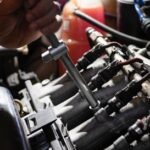
31 Jul Understanding Your Car’s Fuel System
 These days, most vehicles operate through complex electronic devices or mini computers. Unless you own a classic car (or ‘vintage’ as the kids like to say), very few car systems run via purely mechanical methods. Gone are the days when you could pop the hood and wrench on the engine to fix a problem. Now, troubleshooting your car requires a computer interface and specific software to identify an issue. Let’s delve into your modern car’s fuel system to see how the fuel pump or gas cap can trigger a check engine light.
These days, most vehicles operate through complex electronic devices or mini computers. Unless you own a classic car (or ‘vintage’ as the kids like to say), very few car systems run via purely mechanical methods. Gone are the days when you could pop the hood and wrench on the engine to fix a problem. Now, troubleshooting your car requires a computer interface and specific software to identify an issue. Let’s delve into your modern car’s fuel system to see how the fuel pump or gas cap can trigger a check engine light.
Fuel System Components
Remember the song you learned as a kid that went, “the shin bone connected to the knee bone”? Well, your car’s fuel system works kinda the same way. We will go over the fuel system components in order, from start to finish, to see how they all work together.
Gas Cap
Your vehicle’s gas cap provides an airtight seal, which prevents debris from getting into the gas and prevents fuel or harmful vapors from escaping the fuel tank. It also helps maintain the necessary pressure within the fuel system.
Gas Tank
The gas tank holds the majority of the gas stored in your vehicle’s fuel system. To access the gas tank, open the filler door (located on either the driver’s or passenger’s sides) and remove the gas cap.
Fuel Pump
The fuel pump physically moves fuel out of the gas tank into the rest of the fuel system. Some vehicles have more than one fuel pump, but the system still functions the same way. The advantage of having multiple fuel pumps is gasoline does not pool at one end of the tank when turning corners or driving on hills, leaving the fuel pumps dry. At least one fuel pump can pump gas at all times.
Fuel Lines
The fuel lines in your vehicle are usually rigid metal tubes that move the gasoline from the fuel tank, through various components, ending at the combustion chambers. Your vehicle’s fuel lines inhabit spaces where they are safe from road debris, the elements, and excessive heat from the engine and exhaust.
Fuel Filter
The fuel filter removes impurities and particulates from the gasoline before entering the engine. Clean fuel is critical for the fuel system components, as it prolongs their life, reduces excessive carbon build-up, and improves fuel efficiency.
Fuel Pressure Regulator (FPR)
Nearly every modern vehicle with an internal combustion engine has a fuel pressure regulator. Since the fuel pump delivers more fuel to the engine than it needs, a regulator must control the flow of gasoline to optimize fuel combustion and efficiency. Depending on your vehicle’s make and model, your fuel system may have one or more fuel pressure regulators. They may operate purely mechanically or together with an electronic sensor. Your owner’s manual should contain more information on which type of FPR your car has.
Fuel Injectors
Electronic fuel injectors supply fuel via either ‘direct-injection’ or multi-port ‘sequential-injection. Whichever type your vehicle has, electronic fuel injection gives motorists improved gas mileage and more consistent performance. The ECU controls modern automobiles with far greater precision than the older purely mechanical carburetor method.
ECU (Engine Control Unit)
The ECU is a mini computer that controls the injection of the fuel mixture and the accurate timing of the spark to ignite it. It accesses information from various electronic sensors, so the fuel injectors and ignition system are activated precisely to maximize engine performance and fuel economy.
Common Fuel System Problems
Okay, you now have a basic working knowledge of your car’s fuel system. How do you take this info to figure out some common fuel system problems? It’s a process of elimination. We will start by describing symptoms and then outline the faulty components that may cause them.
Car Won’t Start
If you have electric power (lights, windows, radio, etc.), then there’s a good chance the problem involves your fuel system. If there is gas in the tank, then somewhere along the line, the fuel isn’t getting where it needs to go. Here are the top contenders:
- Bad Fuel Pump
- Clogged Fuel Filter
- Electronic Failure of a Sensor, FPR, or ECU
Stalling, Sputtering, Misfiring
A car’s engine requires the perfect air-to-fuel mixture and a precisely timed spark to run correctly. If any of the fuel system components fail, the gasoline will not ignite the combustion chamber properly. This can cause the engine to stall, sputter, or misfire. If your car engine is experiencing any of these problems, it is important to find the cause and fix it as soon as possible to prevent engine damage. A visual inspection of these components may not be enough, and a computerized diagnostic screening may be required.
- Dirty Fuel Injectors
- Clogged Fuel Filter
- Inadequate Compression (may be mechanical or electronic)
- Ignition System (we will cover these components in another blog)
Inconsistent Engine Performance
Ideally, your car should smoothly accelerate when you engage the gas pedal. If there is a delay in acceleration or unexpected power surges, you have inconsistent engine performance. While not all the possible components for engine surges occur in the fuel system, you can start by inspecting and testing these:
- Malfunctioning Fuel Pump
- Faulty Fuel Pressure Regulator
- Bad ECU (or other fuel system sensor)
Check Engine Light
The infamous ‘check engine light’ can be triggered by a wide variety of mechanical and electronic problems. Newer vehicles have a more comprehensive array of warning lights, so check your owner’s manual if you need clarification on which warning lights link to your fuel system performance. A few common fuel system components that will trigger a check engine light in your car’s dashboard are:
- Faulty Gas Cap
- Clogged Fuel Injector(s)
- Fuel Pump Issues
Fuel System Service in Jacksonville, FL
At JJ’s Auto Care, customer satisfaction is our #1 priority. We specialize in honesty. We sell you only the repairs you need when you need them. If you suspect an issue with your car’s fuel system or your check engine light is on, our technicians will conduct a thorough inspection and diagnostic service. We will discover whether you simply need a new gas cap or if there’s a faulty sensor or bad fuel pump.
Schedule Fuel System Diagnostic Service
Stop by JJ’s Auto Care, where our friendly staff of highly trained professionals will treat you like family! To schedule a fuel system diagnostic service appointment, call (904) 721-6646 or visit our website today!

